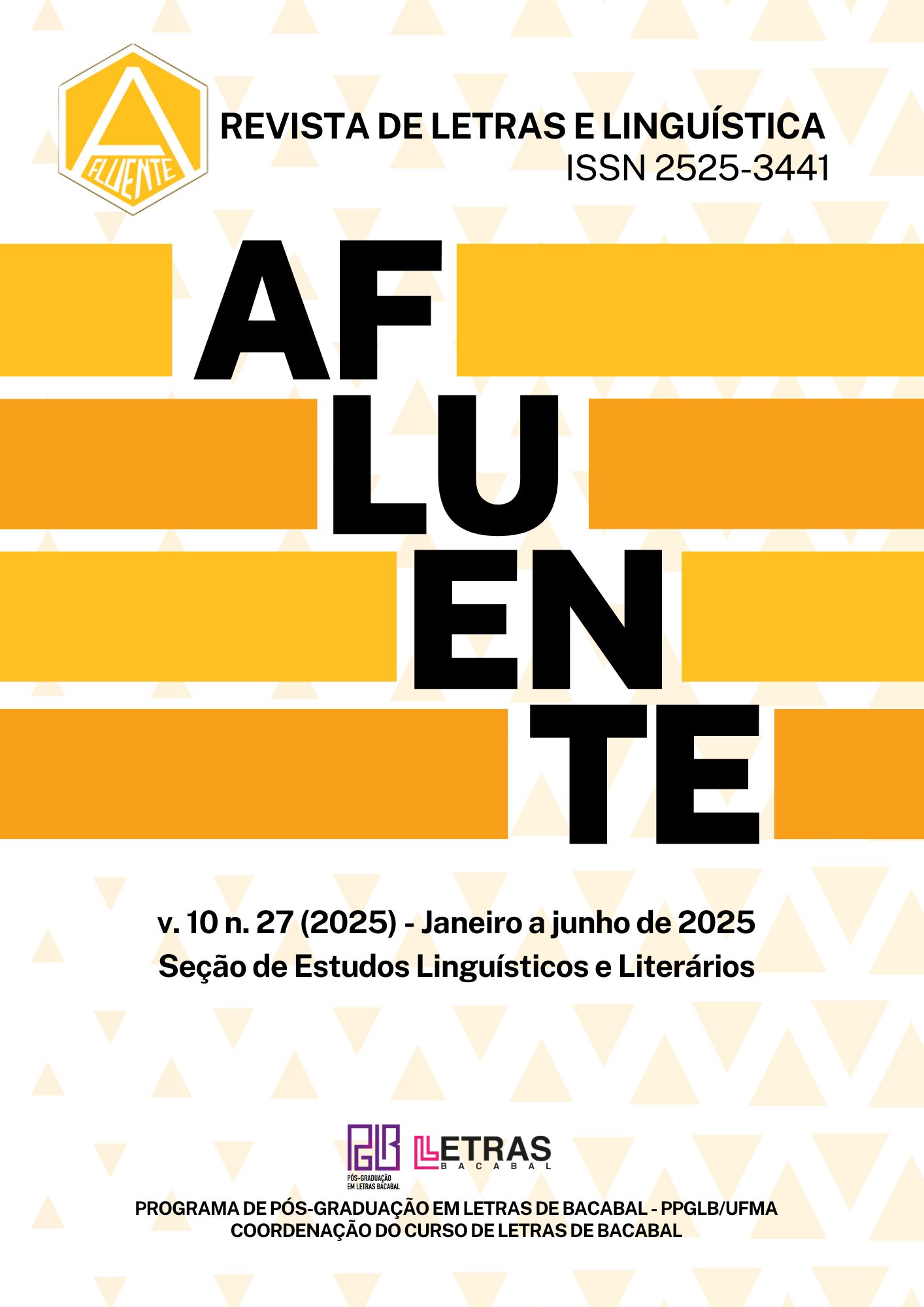FAMILY MEANINGS IN REAL ESTATE ADVERTISEMENTS IN SÃO LUÍS
A MATERIALIST DISCURSIVE ANALYSIS
DOI:
https://doi.org/10.18764/2525-3441v10n27.2025.11Keywords:
Historical materialism. Discourse analysis. Family. Gated communities.Abstract
In this study, we use the French materialist approach of Discourse Analysis (DA) to investigate how memory, family, and discourse shape the idea of family uniqueness anchored in conservative historical aspects. The aim is to understand the effects of segregation and silencing caused by the overlap of multiple and conflicting spaces and memories in the discursive construction of the identity of socially discriminated families regarding access to gated communities. The research analyzes the image-verb materialities of real estate advertisements from three major construction companies in São Luís-MA and state government housing advertisements. We adopted the epistemological frameworks of French DA, highlighting key authors such as Orlandi (2007), Pêcheux (1999, 2006), Lagazzi (2009, 2012), among others. The analysis reveals how discourses on dreams, housing, family, and security articulate movements of affiliation, contradiction, and displacement. It is noted that the examined discourses perpetuate inequalities and shape the perception of what constitutes a “suitable family” for living in gated communities, reinforcing exclusive and discriminatory practices.
Downloads
References
ALTHUSSER, L. Ideologia e aparelhos Ideológicos de Estado. In: ZIZEK, S. Um mapa da ideologia. (Trad. Ribeiro, V.). Rio de Janeiro: Contraponto, 1996.
BAUMAN, Z. Modernidade líquida. Rio de Janeiro: Jorge Zahar, 2001.
COURTINE, J. J. O Chapéu de Clémentis. Observações sobre a memória e o esquecimento na enunciação do discurso político. In: INDURKY, F. (org.). Os múltiplos territórios da análise do discurso. Porto Alegre: Editora Sagra Luzzato. 1999.
COLLINS, P. H.; BILGE, S. Interseccionalidade. São Paulo: Boitempo, n.p. 2021.
DA SILVA BARUFFI, Eduarda et al. Pink Money: compromisso ou oportunismo?. Temas Contemporâneos do Direito , p. 33.
ENGELS, F. A origem da família, da propriedade privada e do estado. Trad. Leandro Konder. 9. ed. Rio de Janeiro: Civilização brasileira. (Coleção Perspectivas do homem, v. 99, série ciências sociais), 1984.
FOUCAULT, M. A arqueologia do saber. Rio de Janeiro: Forense, 2002.
GUEIROS, D. A. Família e Proteção Social: questões atuais e limites da solidariedade familiar. Revista Serviço Social e Sociedade. nº 71, ano XIII. Ed. Cortez, São Paulo, 2002.
LAGAZZI, S. O recorte significante na memória. In: INDURSKY, F., FERREIRA, M. C.; MITTMANN, S. (Org.). O Discurso na Contemporaneidade. Materialidades e Fronteiras. São Carlos: Claraluz, 2009.
LAGAZZI, S. O exercício parafrástico na imbricação material. In: ENCONTRO NACIONAL DA ANPOLL, 27, 2012, Rio de Janeiro, RJ. Resumo expandido. Rio de Janeiro, Anpoll, 2012. p.1-3.
MARCUSCHI, L. A. A questão metodológica na análise da interação verbal: os aspectos qualitativo e quantitativo. IV Encontro Nacional de Interação em Linguagem Verbal e Não-Verbal: Metodologias Qualitativas, Universidade de Brasília, 22-24 de abril, 1999.
MARX, K. Contribuição à crítica da economia política. São Paulo: Martins Fontes, 2003.
MASSMANN, D. A homoafetividade no discurso jurídico. RUA, v. 18, n. 1, p. 49-64, 2012.
ORLANDI, E. P. Análise de Discurso – Princípios & Procedimentos. 3. ed. São Paulo: Pontes, 2001.
ORLANDI, E. P. Análise de discurso: princípios e procedimentos. 6. ed. Campinas: Pontes, 2005.
ORLANDI, E. P. Análise de discurso: Princípios e Procedimentos. 7 ed. Campinas. SP: Pontes, 2007.
ORLANDI, E. P. A Casa e a Rua: uma relação política e social. 693 Educ. Real., Porto Alegre, v. 36, n. 3, p. 693-703, set./dez. 2011.
ORLANDI, E. P. & LAGAZZI, S. Discurso e Textualidade. In Introdução às ciências da linguagem. Suzy Lagazzi-Rodrigues e Eni P. Orlandi (orgs). Campinas, SP: Pontes Editores, 2006.
ORLANDI, E. P. / MASSMANN, D. (Organizadoras). Cultura e Diversidade. Trilogia Travessia da Diversidade – Vol. 1/Campinas, SP: Pontes Editores, 2016.
PÊCHEUX, M. Papel da memória. Em: Achard, P. et al. Papel da memória (Nunes, J.H., Trad. e Intr.). Campinas: Pontes. 1999.
PÊCHEUX, M. O discurso: estrutura ou acontecimento. 4ª edição. Campinas, SP: Pontes Editores. Análise de Discurso: três épocas (1983). In: GADET, F. e HAK, T. 2006.
PRADO, D. O que é família. 2º edição. São Paulo. Editora Brasiliense, 1981.
RIBEIRO, D. O que é lugar de fala? Belo Horizonte: Letramento: Justificando, 2017.
RAMOS, T. V. O sujeito entre culturas: O espaço da diferença no encontro com o outro/Outro / Thaís Valim Ramos. -- 2017. 188 f.
SAFFIOTI, H. A Mulher na Sociedade de Classes: mito e realidade. Heleieth Saffioti. 3a edição. São Paulo: Editora expressão popular, 2013 [1969].
SZYMANSKI, H. Viver em família como experiência de cuidado mútuo: desafios de um mundo em mudança. Revista Serviço Social e Sociedade, São Paulo, ano 21, n. 71, p. 9-25, set.2002.
SIERRA, Vânia Morales. Família: teorias e debates. Editora Saraiva, 2012.
ZOPPI-FONTANA, Mónica G. Cidade e discurso: paradoxos do real, do imaginário, do virtual. In: RUA, Rev. do Núcleo de Desenvolvimento da Criatividade, n. 4, p.39- 54. Campinas, NUDECRI, 1998.
Downloads
Published
How to Cite
Issue
Section
License
Copyright (c) 2025 Afluente: Revista de Letras e Linguística

This work is licensed under a Creative Commons Attribution 4.0 International License.
Direitos autorais Afluente: Revista Eletrônica de Letras e Linguística
Este trabalho está licenciado com uma Licença Creative Commons - Atribuição 4.0 Internacional.














